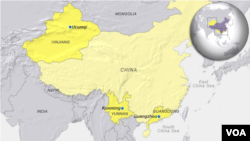BEIJING —
In a little more than two months, China has seen three violent attacks at major train stations. Authorities say extremist terrorists carried out at least two of the attacks, in a widening security threat that has heightened concerns among the public. The violence comes amid government pledges to get tougher on terrorism.
Dozens fled and six were injured when a knife-wielding attacker struck at Guangzhou’s main train station earlier this week. Authorities say they shot the assailant after he refused to respond to warning shots, and it appears he was acting alone. So far, there has been no link between this week’s incident and two other attacks - one in Kunming in early March and another in the capital of China’s restive region of Xinjiang just last week.
Authorities say religious extremists carried out the attacks in Kunming and Urumqi, and that the suspects were members of Xinjiang’s mainly Muslim Uighur minority group.
Last week’s attack in Urumqi came just shortly after China’s President Xi Jinping visited Xinjiang and just as he was pledging to take decisive action against terrorists. The deadly bomb and knife attack killed three and injured nearly 80 people.
Government challenge
Han Lianchao, a visiting researcher at Washington D.C.’s Hudson Institute, said with the attack in Urumqi coming so soon after Xi's visit to Xinjiang, it poses a significant challenge to the government. He notes that Xi's claims that he would not hesitate to use iron-fists to deal with terrorists did little to stop the attack. Hao added that the symbolic value of the attack was far greater than the physical damage.
A new policy paper on national security, released this week, says China was hit with 10 terrorist attacks last year alone. While most occurred in Xinjiang, the list also included an attack on Tiananmen Square in Beijing. In the wake of the Guangzhou attack this week, authorities carried out patrols at train stations in Shanghai and Beijing. Analysts say the threat appears to be spreading and it is fueling the discussion.
Over the past few months, Xi has increasingly put more emphasis on the issue of terrorism in his speeches, and he held the first meeting of his newly formed National Security Commission. The body is the first of its kind for China and is seeking to take what authorities say is a more comprehensive approach to threats at home and abroad.
In places such as Xinjiang, the government so far has relied heavily on economic progress as a cure-all for the problem, but critics say religious oppression and government policies toward minorities are a key source of local discontent.
But in a recent speech, when Xi pledged to send terrorists scurrying into the streets, he also spoke about the need to address social conflicts as a means of preventing such problems in the future.
Social conflicts
Some analysts say this could mark a departure from the government’s past approach in places such as Xinjiang, where authorities have routinely used increased police presence and religious oppression in response to unrest.
Gardner Bovingdon, a China ethnic minorities analyst at Indiana University, said, “When Xi Jinping says he wants to do something else, I think he’s put down a rhetorical marker, but the real question will be does he follow that up with some concrete policies, some changes in policy direction from the ones that we’ve seen? And I fear that he will not.”
James Nolt, a senior fellow at the World Policy Institute said while every country worries about terrorism, he does not yet see any substantial difference between Xi and his predecessors.
“That sort of thing is always a national security concern and I don’t see any change in policy that really represents a very large shift in resources or change in the type of policy," said Nolt. "It is just being talked about more because there has been incidents in the news recently.”
Chinese analysts say violent terrorism is the biggest threat to domestic security and are looking to Xi’s newly formed National Security Commission to play a guiding role in establishing clearer legal and policy guidelines. China’s new report on national security says that while the military played a leading role in handling domestic security in the past, a more comprehensive approach spearheaded by the commission is needed now to deal with the growing complexity of the problem.
Dozens fled and six were injured when a knife-wielding attacker struck at Guangzhou’s main train station earlier this week. Authorities say they shot the assailant after he refused to respond to warning shots, and it appears he was acting alone. So far, there has been no link between this week’s incident and two other attacks - one in Kunming in early March and another in the capital of China’s restive region of Xinjiang just last week.
Authorities say religious extremists carried out the attacks in Kunming and Urumqi, and that the suspects were members of Xinjiang’s mainly Muslim Uighur minority group.
Last week’s attack in Urumqi came just shortly after China’s President Xi Jinping visited Xinjiang and just as he was pledging to take decisive action against terrorists. The deadly bomb and knife attack killed three and injured nearly 80 people.
Government challenge
Han Lianchao, a visiting researcher at Washington D.C.’s Hudson Institute, said with the attack in Urumqi coming so soon after Xi's visit to Xinjiang, it poses a significant challenge to the government. He notes that Xi's claims that he would not hesitate to use iron-fists to deal with terrorists did little to stop the attack. Hao added that the symbolic value of the attack was far greater than the physical damage.
A new policy paper on national security, released this week, says China was hit with 10 terrorist attacks last year alone. While most occurred in Xinjiang, the list also included an attack on Tiananmen Square in Beijing. In the wake of the Guangzhou attack this week, authorities carried out patrols at train stations in Shanghai and Beijing. Analysts say the threat appears to be spreading and it is fueling the discussion.
Over the past few months, Xi has increasingly put more emphasis on the issue of terrorism in his speeches, and he held the first meeting of his newly formed National Security Commission. The body is the first of its kind for China and is seeking to take what authorities say is a more comprehensive approach to threats at home and abroad.
In places such as Xinjiang, the government so far has relied heavily on economic progress as a cure-all for the problem, but critics say religious oppression and government policies toward minorities are a key source of local discontent.
But in a recent speech, when Xi pledged to send terrorists scurrying into the streets, he also spoke about the need to address social conflicts as a means of preventing such problems in the future.
Social conflicts
Some analysts say this could mark a departure from the government’s past approach in places such as Xinjiang, where authorities have routinely used increased police presence and religious oppression in response to unrest.
Gardner Bovingdon, a China ethnic minorities analyst at Indiana University, said, “When Xi Jinping says he wants to do something else, I think he’s put down a rhetorical marker, but the real question will be does he follow that up with some concrete policies, some changes in policy direction from the ones that we’ve seen? And I fear that he will not.”
James Nolt, a senior fellow at the World Policy Institute said while every country worries about terrorism, he does not yet see any substantial difference between Xi and his predecessors.
“That sort of thing is always a national security concern and I don’t see any change in policy that really represents a very large shift in resources or change in the type of policy," said Nolt. "It is just being talked about more because there has been incidents in the news recently.”
Chinese analysts say violent terrorism is the biggest threat to domestic security and are looking to Xi’s newly formed National Security Commission to play a guiding role in establishing clearer legal and policy guidelines. China’s new report on national security says that while the military played a leading role in handling domestic security in the past, a more comprehensive approach spearheaded by the commission is needed now to deal with the growing complexity of the problem.













